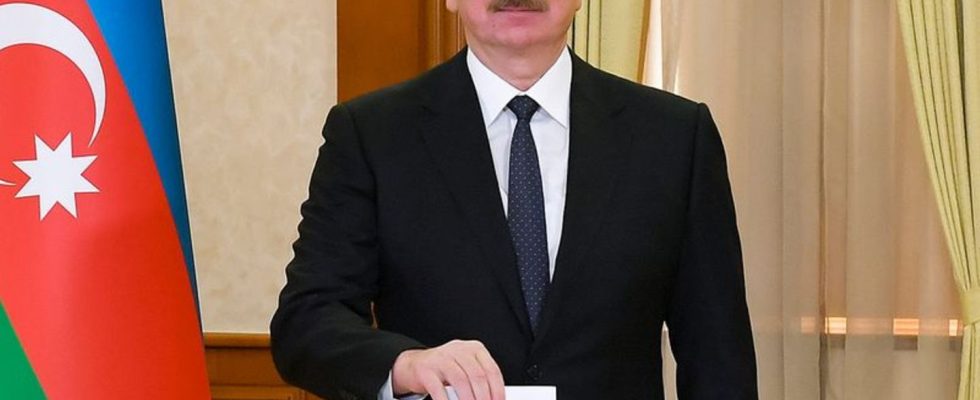Choose
Authoritarian Aliyev re-elected in Azerbaijan
Ilham Aliyev was re-elected President of Azerbaijan. photo
© Vugar Amrullaev/Azerbaijan State News Agency AZERTAC/AP/dpa
With the conquest of Karabakh behind him, Azerbaijan’s President Aliyev has been confirmed in office. But that alone hardly explains his miraculous success. Observers criticize the choice.
After more than 20 years in power, head of state Ilham Aliyev has settled into an authoritarian regime Azerbaijan was again celebrated as the clear winner in an early and very controversial presidential election. After counting almost all ballot papers, Aliyev received 92.05 percent of the vote, the electoral commission of the oil-rich South Caucasus state announced on Thursday in the capital Baku.
After the victory against the hostile neighboring country of Armenia and the conquest of the Nagorno-Karabakh conflict region, the 62-year-old has now secured his power for another seven years. However, independent observers denounce serious violations surrounding the vote, which was called for by more than six million people in the Caspian Sea country.
OSCE criticizes election
The election observation mission of the Organization for Security and Cooperation in Europe (OSCE) criticized the fact that critics were being suppressed in Azerbaijan and that Aliyev, who took over the presidency from his father Heydar Aliyev in 2003, had no serious competitors. “Some opposition parties did not participate at all, citing a lack of adequate democratic conditions,” said mission chief Eoghan Murphy. His OSCE colleague Artur Herassymov spoke of a “restrictive environment” in which the elections were held in the country of ten million inhabitants.
Specifically, the observers criticized the fact that none of the six opposing candidates seriously questioned Aliyev’s policies, “so that voters had no real alternative.” During the vote, some “significant deficiencies” were discovered in the more than 6,500 polling stations – such as inadequate protection against electoral fraud caused by multiple votes. This also raises doubts about the actual voter turnout, which the Azerbaijani side officially stated was almost 77 percent.
Restrictions on freedom of assembly and expression
The OSCE observers also pointed to increasing restrictions on freedom of assembly and expression in Azerbaijan and criticized the arrest of numerous independent journalists in the run-up to the election. These had exposed cases of corruption in Aliyev’s power apparatus.
Despite all these allegations, Baku publicly celebrated Aliyev’s re-election. In the metropolis of millions, numerous people flocked to the streets at night with Aliyev posters and Azerbaijan flags. A fireworks display was held in the city of Shusha in Karabakh. According to official Azerbaijani information, Aliyev significantly increased his result in his official fifth election victory in a row compared to the last presidential election in 2018. At that time it was given as 86 percent.
Congratulations came from several international heads of state and government, including Kremlin chief Vladimir Putin and China’s state and party leader Xi Jinping. Ukrainian President Volodymyr Zelenskyj also congratulated. His country, which was attacked by Russia, has in the past received humanitarian aid from Azerbaijan, also an ex-Soviet republic.
Presidential election brought forward
Aliyev had the presidential election, which was actually planned for 2025, brought forward. He officially justified the move by saying that after the conquest of Nagorno-Karabakh and the restoration of Azerbaijan’s territorial integrity, he now needed new legitimacy. However, independent observers suspect that the authoritarian ruler was more interested in exploiting the Karabakh triumph before his people may look more closely at Azerbaijan’s difficult economic situation next year.
Azerbaijani troops attacked Nagorno-Karabakh, over which there had already been a war in 2020, again last autumn and also conquered the remaining parts. Although the region lies on Azerbaijani territory, until a few months ago it was predominantly inhabited by ethnic Armenians. For decades, Karabakh was contested between Azerbaijanis and Armenians. The attacks by the Azerbaijani army caused more than 100,000 Karabakh residents to flee. Armenia accused Azerbaijan of expulsion and “ethnic cleansing.”
Despite the precarious human rights situation and the military violence against Nagorno-Karabakh, Azerbaijan is an important energy supplier for the EU, which wants to become independent of Russian gas in the long term. Baku will also host the world climate conference COP29 in November. Both are repeatedly criticized.

